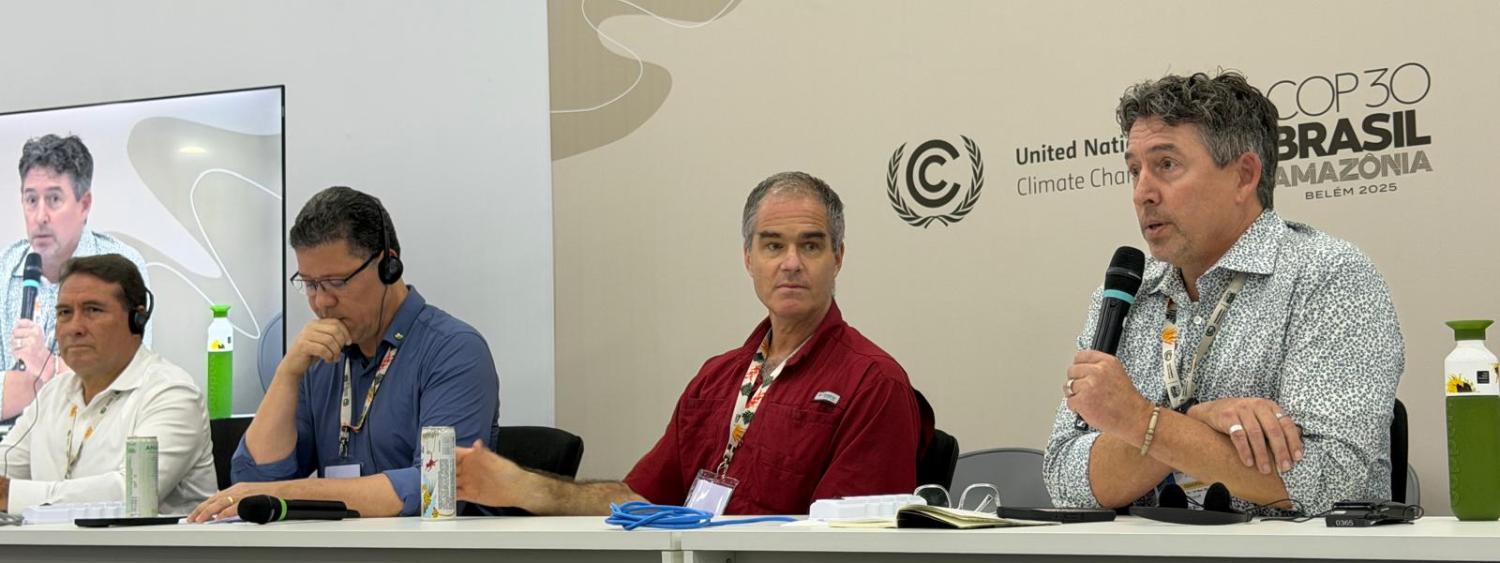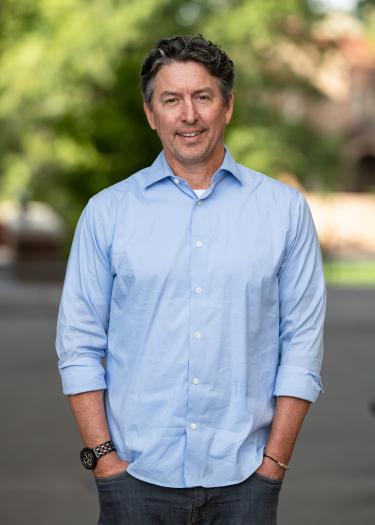COP movement on climate change continues despite missing US delegation

Max Boykoff, executive faculty director of the Buckley Center for Sustainability Education at CU Boulder, speaks on a panel at COP30 in Brazil.
As the annual United Nations COP30 enters its second week, international policymakers are discussing critical issues, including the rise in natural disasters worldwide and the next steps for global fossil fuel policy. With no official U.S. delegates in attendance this year, state representatives, academics and other U.S. nationals have stepped in to represent the country in new ways.
COP30 is being held in Belém, Brazil, and Max Boykoff, executive faculty director of the Buckley Center for Sustainability Education at CU Boulder, attended the first week. We sat down with him to hear about his experience, reflections on COP30 and his perspective on what it looked like without U.S. representatives at the table.

Max Boykoff
COP30's location in the Amazon carried enormous symbolic and political weight—how did this change the conversations?
Yes, Belem, Brazil, is a toughened, weathered city near the equator at the mouth of the Amazon River and edge of the Amazon Rainforest. This city hosts the event as Brazilian President Luiz Inácio Lula da Silva was determined to bring the eyes of the world and nearly 60,000 COP30 participants to Belem.
The placement of the event also lowered travel barriers for many Indigenous groups in the Amazon region. It has been reported there have been more than 900 Indigenous participants at this COP30, which is three times higher than the last meeting in Baku, Azerbaijan.
How did the absence of the US shape the tone of the negotiations and the conversations?
Yes, unfortunately, the Trump Administration chose not to send any U.S. delegates to COP30. This absence means missed opportunities to demonstrate moral and material leadership; engage in the clean energy transition; and discuss trade, security, energy and human rights issues.
The U.S. is nearly alone in missing the talks, with only three other countries—Afghanistan, Myanmar and San Marino—choosing not to participate. Notably, when the Trump Administration withdrew from the Paris Agreement, a legally binding international commitment to combat climate change and reduce global emission, the U.S. joined only Iran, Yemen and Libya on the short list of non-participants in the climate pact.
Did the lack of US engagement open space for other countries, regions or non-state actors to step forward, or did it create a vacuum that slowed momentum?
Yes, other countries and member states are stepping into the leadership vacuum left by the absence of U.S. negotiators. Notably, I have observed Brazil, China, Kenya and Malawi stepping forward in vocal roles. Also, I sat in on some of California Gov. Gavin Newsom’s visit here, demonstrating ongoing subnational U.S. engagement in the absence of national leadership at present. Additionally, it was reported that New Mexico Gov. Michelle Lujan Grisham also was in attendance last week.
There are many other U.S.-based subnational public officials as well as university faculty and students that are nonetheless continuing to work diligently despite the absence of the U.S. negotiating team. There is also an active "America is All In" coalition here (representing U.S. cities; states; tribal nations; businesses; schools; and institutions of faith, health and culture) that is hosting events and activities to demonstrate the stance of the U.S. Trump Administration is limited.
It is hard to say yet whether U.S. delegation non-participation is slowing momentum. Some here have expressed relief that Trump officials are not in the way or actively obstructing concerted action here. But looking at this through the lens of greenhouse gas emissions paired with capacity to constructively contribute to solutions, makes their absence unavoidably felt: Historically, the U.S. has been the largest emitter of CO2 globally and is the world’s richest country on planet Earth.
Key takeaways
While U.S. federal standing has diminished, challenges persist. Those most at risk from climate change often have the least power to influence solutions. However, youth and civil society mobilizations, including Indigenous-led movements, have been visible throughout COP30 and across Belém, advocating for deep decarbonization, opposition to extractive and exploitative industries, and support for environmental justice.
A landmark Declaration on Information Integrity on Climate Change was launched at COP30, establishing shared international commitments to address climate disinformation and promote evidence-based information. Thirteen countries have signed so far, pledging to support information integrity at international, national and local levels, in line with human rights and Paris Agreement principles.
What role did higher education institutions play at COP30, and how can they meaningfully contribute when official pathways feel gridlocked?
This has been dubbed the "mutirão meeting." This Portuguese word signifies coming together in collective efforts to achieve a common goal. This has also been referred to as "the truth COP" and "the implementation COP," as representatives of most nations around the world gather here to make progress on international climate policy to combat climate change.
With collaborators at Colorado State and Colorado College, we have leaned into our privileges and responsibilities as researchers and academics advising and mentoring students. With them I represented CU Boulder as we co-hosted and led a discussion with university graduate and undergraduate students and four former U.S. climate negotiators/delegates. About 70 students participated and had the chance to ask questions ranging from how they themselves can become a negotiator to how they view the current state of negotiations.
This was a moment where students not only gathered to ask these questions but it was also a moment where we shared our perspectives— from hopes and ambitions to worries and concerns about the ongoing climate negotiations. It was a positive experience that we seek to continue providing in future COP meetings in collaboration with Colorado-based universities and colleges.
How did you and others from CU Boulder participate/show up at COP30 this year?
This year I spoke at four events, while attending several others and also observing parts of the ongoing negotiations.
Among them I spoke about media, advertising and public relations contributions to mis- and dis-information about climate change at one panel event called "Research and Evidence to Strengthen Information Integrity on Climate Change." In addition, I also spoke at another panel event focused on implementing new forest economies, climate finance, Indigenous digital sovereignty, and climate communications at the subnational level.


